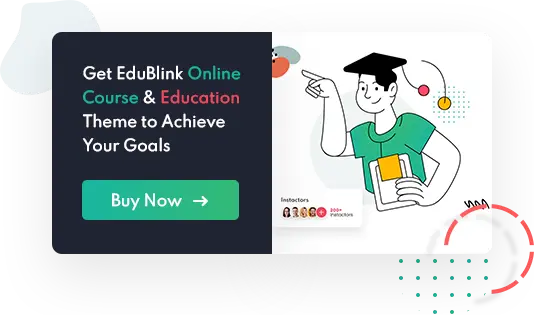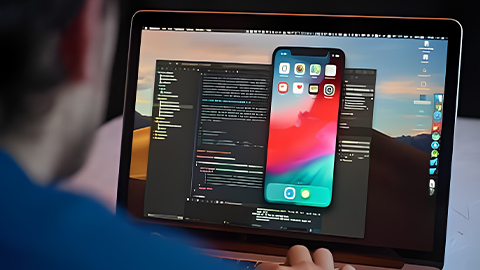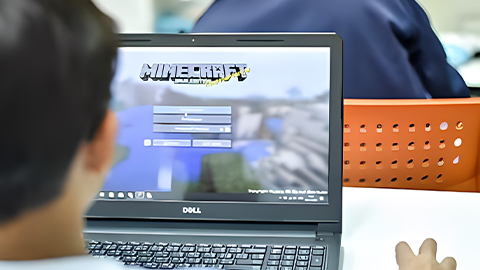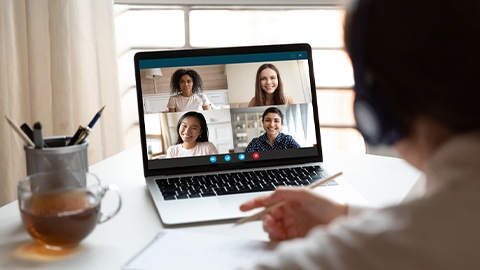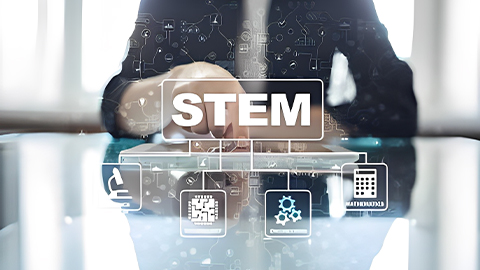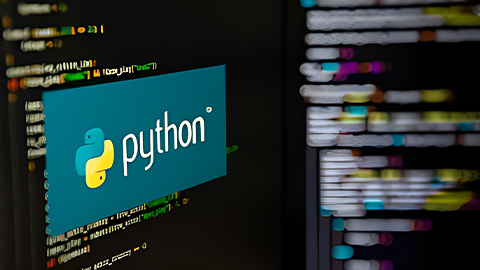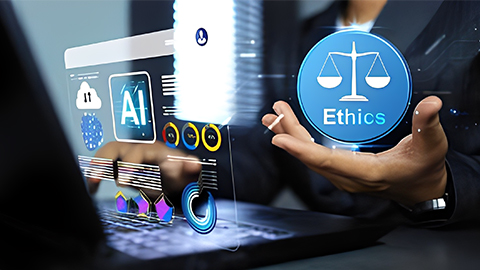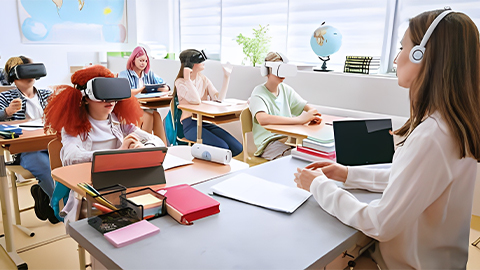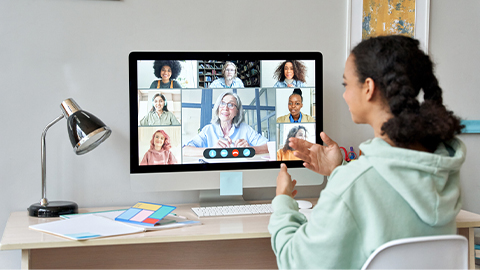

Coding For Kids
Coding For Kids relates to Teaching & Academics, Online Education
Courses to get you started
Master Agile, SAM, and action mapping instructional design models and how to use them in course development.<br/> Learn how to adapt instructional design concepts to specific learning settings and objectives for course flexibility and responsiveness.<br/> Create authentic, engaging learning experiences using problem-based learning (PBL) and scenario-based learning.
Master Agile, SAM, and action mapping instructional design models and how to use them in course development.<br/> Learn how to adapt instructional design concepts to specific learning settings and objectives for course flexibility and responsiveness.<br/> Create authentic, engaging learning experiences using problem-based learning (PBL) and scenario-based learning.
- 12 Lessons
- 20 Students
Learn the essentials of developing mobile apps, such as user interfaces, navigation, and basic features.<br/> Learn how to construct interactive wireframes and prototypes to plan and visualize the features and design of your app.<br/> Build your own straightforward mobile applications utilizing user-friendly app development tools to gain real-world experience.
Learn the essentials of developing mobile apps, such as user interfaces, navigation, and basic features.<br/> Learn how to construct interactive wireframes and prototypes to plan and visualize the features and design of your app.<br/> Build your own straightforward mobile applications utilizing user-friendly app development tools to gain real-world experience.
- 15 Lessons
- 20 Students
Learn about coding principles while modifying the game's environment with block-based programming in the well-known game Minecraft.<br/> Create your mods, structures, and interactive elements to personalize the Minecraft experience.<br/> Use your creativity to create original Minecraft experiences while using your coding skills to complete in-game challenges.
Learn about coding principles while modifying the game's environment with block-based programming in the well-known game Minecraft.<br/> Create your mods, structures, and interactive elements to personalize the Minecraft experience.<br/> Use your creativity to create original Minecraft experiences while using your coding skills to complete in-game challenges.
- 14 Lessons
- 20 Students
Learn the fundamentals of connecting electronic parts to circuits and Arduino microcontrollers.<br/> To control sensors, LEDs, motors, and other electronic devices, write Arduino code proficiently.<br/> You can use your skills by developing projects like smart devices, robotic systems, and IoT (Internet of Things) devices.
Learn the fundamentals of connecting electronic parts to circuits and Arduino microcontrollers.<br/> To control sensors, LEDs, motors, and other electronic devices, write Arduino code proficiently.<br/> You can use your skills by developing projects like smart devices, robotic systems, and IoT (Internet of Things) devices.
- 16 Lessons
- 20 Students
Learn about intellectual property laws, licensing, and public domain as they pertain to online learning.<br/> Learn how to prevent plagiarism and copyright violations in your course materials to maintain the integrity of your intellectual property.<br/> Examine the moral issues that arise from using other people's content in e-learning courses, such as proper attribution and authorization.
Learn about intellectual property laws, licensing, and public domain as they pertain to online learning.<br/> Learn how to prevent plagiarism and copyright violations in your course materials to maintain the integrity of your intellectual property.<br/> Examine the moral issues that arise from using other people's content in e-learning courses, such as proper attribution and authorization.
- 8 Lessons
- 20 Students
To produce top-notch video material for e-learning, master advanced video production methods, including lighting, sound, and camera work.<br/> Learn how to use video editing software to edit, improve, and polish video content for education.<br/> Consider incorporating interactive components like quizzes, annotations, and branching scenarios into video content to increase learner engagement.
To produce top-notch video material for e-learning, master advanced video production methods, including lighting, sound, and camera work.<br/> Learn how to use video editing software to edit, improve, and polish video content for education.<br/> Consider incorporating interactive components like quizzes, annotations, and branching scenarios into video content to increase learner engagement.
- 12 Lessons
- 20 Students
Create a systematized approach for gathering student feedback and assessments of the instructors' structure, substance, and efficacy.<br/> Learn how to evaluate student comments and course data to find areas to improve and make informed decisions.<br/> Implement techniques to consider student input and continually improve your courses to ensure they remain useful and efficient.
Create a systematized approach for gathering student feedback and assessments of the instructors' structure, substance, and efficacy.<br/> Learn how to evaluate student comments and course data to find areas to improve and make informed decisions.<br/> Implement techniques to consider student input and continually improve your courses to ensure they remain useful and efficient.
- 8 Lessons
- 20 Students
Explore how to build training programs to improve communication, teamwork, leadership, and problem-solving soft skills.<br/> Design scenario-based learning exercises to practice and apply soft skills in real-world professional or interpersonal scenarios.<br/> Help students improve their soft skills by using effective assessment and feedback systems.
Explore how to build training programs to improve communication, teamwork, leadership, and problem-solving soft skills.<br/> Design scenario-based learning exercises to practice and apply soft skills in real-world professional or interpersonal scenarios.<br/> Help students improve their soft skills by using effective assessment and feedback systems.
- 10 Lessons
- 20 Students
Learn to incorporate STEM concepts and practices into educational materials to promote STEM literacy.<br/> Design hands-on STEM experiments, projects, and activities that teach experiential learning and problem-solving.<br/> Create interdisciplinary STEM learning experiences that connect STEM subjects to real-world applications.
Learn to incorporate STEM concepts and practices into educational materials to promote STEM literacy.<br/> Design hands-on STEM experiments, projects, and activities that teach experiential learning and problem-solving.<br/> Create interdisciplinary STEM learning experiences that connect STEM subjects to real-world applications.
- 10 Lessons
- 20 Students
Learn to program robots to carry out tasks and gain a fundamental understanding of robot control, sensors, and actuators.<br/> Investigate artificial intelligence and machine learning principles to educate robots to adapt and make judgments.<br/> Build and program robots using your coding skills to obtain real-world experience in robotics and AI development.
Learn to program robots to carry out tasks and gain a fundamental understanding of robot control, sensors, and actuators.<br/> Investigate artificial intelligence and machine learning principles to educate robots to adapt and make judgments.<br/> Build and program robots using your coding skills to obtain real-world experience in robotics and AI development.
- 24 Lessons
- 20 Students
Develop the ability to assist students with technical problems related to platform navigation, multimedia, and course access.<br/> Learn how to speak with learners effectively so you can handle their issues and queries through the e-learning process.<br/> Develop problem-solving skills to spot and fix any technical and instructional problems in online courses, resulting in a seamless learning environment.
Develop the ability to assist students with technical problems related to platform navigation, multimedia, and course access.<br/> Learn how to speak with learners effectively so you can handle their issues and queries through the e-learning process.<br/> Develop problem-solving skills to spot and fix any technical and instructional problems in online courses, resulting in a seamless learning environment.
- 8 Lessons
- 20 Students
Learn about the fundamentals of game creation, such as level design, player interaction, and game mechanics.<br/> Develop your Python programming skills to develop game logic and features in 2D and 3D games.<br/> Learn how to publish and distribute your Python games so that a larger audience may play them.
Learn about the fundamentals of game creation, such as level design, player interaction, and game mechanics.<br/> Develop your Python programming skills to develop game logic and features in 2D and 3D games.<br/> Learn how to publish and distribute your Python games so that a larger audience may play them.
- 12 Lessons
- 20 Students
In biology, physics, and environmental science, use code to conduct experiments, analyze data, and show outcomes.<br/> Enhance your scientific inquiry and investigation capacity by learning to analyze scientific data and graphs.<br/> Integrate coding with STEM ideas by using coding expertise to solve problems and conduct research in science.
In biology, physics, and environmental science, use code to conduct experiments, analyze data, and show outcomes.<br/> Enhance your scientific inquiry and investigation capacity by learning to analyze scientific data and graphs.<br/> Integrate coding with STEM ideas by using coding expertise to solve problems and conduct research in science.
- 14 Lessons
- 20 Students
Learn about astronomy and space science by participating in coding projects, simulations, and data analysis with a space theme.<br/> Use coding to tackle space-related issues, such as spacecraft navigation and modeling of astronomical events.<br/> Create activities that will improve your understanding of space, such as simulations of planet exploration and games with a space theme.
Learn about astronomy and space science by participating in coding projects, simulations, and data analysis with a space theme.<br/> Use coding to tackle space-related issues, such as spacecraft navigation and modeling of astronomical events.<br/> Create activities that will improve your understanding of space, such as simulations of planet exploration and games with a space theme.
- 16 Lessons
- 20 Students
Recognize how to analyze needs to locate training gaps and create e-learning solutions that adhere to certain company training goals.<br/> Research methods for including workers in e-learning and creating a culture of continuous learning in the workplace.<br/> Learn how to quantify the return on investment (ROI) of corporate e-learning programs and show how they affect organizational performance.
Recognize how to analyze needs to locate training gaps and create e-learning solutions that adhere to certain company training goals.<br/> Research methods for including workers in e-learning and creating a culture of continuous learning in the workplace.<br/> Learn how to quantify the return on investment (ROI) of corporate e-learning programs and show how they affect organizational performance.
- 12 Lessons
- 20 Students
Develop skills in constructing formative, summative, genuine, and performance-based assessments. Learn how to collect and analyze assessment data to evaluate student performance, find areas for growth, and make data-driven decisions. Make course content, instruction, and learning outcomes better by providing students with constructive feedback.
Develop skills in constructing formative, summative, genuine, and performance-based assessments. Learn how to collect and analyze assessment data to evaluate student performance, find areas for growth, and make data-driven decisions. Make course content, instruction, and learning outcomes better by providing students with constructive feedback.
- 8 Lessons
- 20 Students
Use language acquisition theories and models to construct language learning materials that match learners' cognitive and developmental phases.<br/> Integrate audio, video, text, and interactive exercises to make language learning fun and successful.<br/> Design language learning tools that respect cultural diversity and foster inclusivity with cultural competence.
Use language acquisition theories and models to construct language learning materials that match learners' cognitive and developmental phases.<br/> Integrate audio, video, text, and interactive exercises to make language learning fun and successful.<br/> Design language learning tools that respect cultural diversity and foster inclusivity with cultural competence.
- 12 Lessons
- 20 Students
Understand copyright, fair use, and intellectual property rights for educational products like text, photos, multimedia, and OER.<br/> Ensure ethical and legal compliance when using third-party content, attribution, licensing, and permissions in instructional materials.<br/> Use plagiarism detection tools and best practices to prevent plagiarism and maintain academic integrity in educational settings.
Understand copyright, fair use, and intellectual property rights for educational products like text, photos, multimedia, and OER.<br/> Ensure ethical and legal compliance when using third-party content, attribution, licensing, and permissions in instructional materials.<br/> Use plagiarism detection tools and best practices to prevent plagiarism and maintain academic integrity in educational settings.
- 8 Lessons
- 20 Students
Recognize e-learning best practices and standards for quality assurance, including course design, lesson plans, and evaluations.<br/> Learn how to evaluate and quantify the success of your online courses in terms of student happiness, learning outcomes, and engagement.<br/> Based on student input, data analysis, and shifting educational trends, develop strategies for continuing course development.
Recognize e-learning best practices and standards for quality assurance, including course design, lesson plans, and evaluations.<br/> Learn how to evaluate and quantify the success of your online courses in terms of student happiness, learning outcomes, and engagement.<br/> Based on student input, data analysis, and shifting educational trends, develop strategies for continuing course development.
- 10 Lessons
- 20 Students
Master virtual reality technology, hardware, software, and instructional applications.<br/> To engage learners, develop immersive and interactive VR learning experiences like 360-degree simulations, virtual labs, and virtual field trips.<br/> Explore VR accessibility and ethical principles for acceptable use in education and training.
Master virtual reality technology, hardware, software, and instructional applications.<br/> To engage learners, develop immersive and interactive VR learning experiences like 360-degree simulations, virtual labs, and virtual field trips.<br/> Explore VR accessibility and ethical principles for acceptable use in education and training.
- 10 Lessons
- 20 Students
Using Scratch, create animated stories and interactive narratives emphasizing conversation, character development, and plot development.<br/> Learn the principles and methods of animation to use coding and sprites to bring characters and scenes to life.<br/> Engage the Scratch community and share interactive stories while honing your storytelling and presenting abilities.
Using Scratch, create animated stories and interactive narratives emphasizing conversation, character development, and plot development.<br/> Learn the principles and methods of animation to use coding and sprites to bring characters and scenes to life.<br/> Engage the Scratch community and share interactive stories while honing your storytelling and presenting abilities.
- 12 Lessons
- 20 Students
Learn how to certify online courses for academic credit, professional growth, or industry recognition.<br/> Learn about educational institutions and accrediting body accreditation standards to guarantee your courses satisfy quality standards.<br/> Learn how to create syllabi, assessments, and learning outcomes for certification and accreditation.
Learn how to certify online courses for academic credit, professional growth, or industry recognition.<br/> Learn about educational institutions and accrediting body accreditation standards to guarantee your courses satisfy quality standards.<br/> Learn how to create syllabi, assessments, and learning outcomes for certification and accreditation.
- 10 Lessons
- 20 Students
Explore different options for monetizing your courses, such as one-time purchases, subscriptions, freemiums, and packaged courses.<br/> Learn efficient marketing and promotion techniques to draw in more students and boost sales of your online courses.<br/> Create price methods that align with your target audience, the course content, and the competition to maximize your revenue.
Explore different options for monetizing your courses, such as one-time purchases, subscriptions, freemiums, and packaged courses.<br/> Learn efficient marketing and promotion techniques to draw in more students and boost sales of your online courses.<br/> Create price methods that align with your target audience, the course content, and the competition to maximize your revenue.
- 10 Lessons
- 20 Students
Learn about scientific inquiry and how to create inquiry-based learning experiences that foster curiosity, experimentation, and critical thinking.<br/> Create interactive simulations and virtual experiments to teach complex scientific subjects hands-on.<br/> Educational goals and benchmarks should be aligned with Next Generation Scientific Goals (NGSS).
Learn about scientific inquiry and how to create inquiry-based learning experiences that foster curiosity, experimentation, and critical thinking.<br/> Create interactive simulations and virtual experiments to teach complex scientific subjects hands-on.<br/> Educational goals and benchmarks should be aligned with Next Generation Scientific Goals (NGSS).
- 10 Lessons
- 20 Students
Learn the fundamentals of internet safety, such as how to use the internet safely and secure your personal information online.<br/> Learn the principles of ethical hacking, including how to spot vulnerabilities and defend against online attacks.<br/> Explore how to use technology ethically and responsibly, encouraging good online conduct.
Learn the fundamentals of internet safety, such as how to use the internet safely and secure your personal information online.<br/> Learn the principles of ethical hacking, including how to spot vulnerabilities and defend against online attacks.<br/> Explore how to use technology ethically and responsibly, encouraging good online conduct.
- 12 Lessons
- 20 Students
Create online courses that automatically adapt to different mobile devices, providing the best learning experience.<br/> Develop mobile applications and consider factors to consider when delivering course material via mobile devices.<br/> To accommodate students who access courses on smartphones and tablets, improve the usability and accessibility of your mobile learning materials.
Create online courses that automatically adapt to different mobile devices, providing the best learning experience.<br/> Develop mobile applications and consider factors to consider when delivering course material via mobile devices.<br/> To accommodate students who access courses on smartphones and tablets, improve the usability and accessibility of your mobile learning materials.
- 8 Lessons
- 20 Students
Relevant Courses
Recognize e-learning best practices and standards for quality assurance, including course design, lesson plans, and evaluations.<br/> Learn how to evaluate and quantify the success of your online courses in terms of student happiness, learning outcomes, and engagement.<br/> Based on student input, data analysis, and shifting educational trends, develop strategies for continuing course development.
Recognize e-learning best practices and standards for quality assurance, including course design, lesson plans, and evaluations.<br/> Learn how to evaluate and quantify the success of your online courses in terms of student happiness, learning outcomes, and engagement.<br/> Based on student input, data analysis, and shifting educational trends, develop strategies for continuing course development.
- 10 Lessons
- 20 Students
Develop the ability to assist students with technical problems related to platform navigation, multimedia, and course access.<br/> Learn how to speak with learners effectively so you can handle their issues and queries through the e-learning process.<br/> Develop problem-solving skills to spot and fix any technical and instructional problems in online courses, resulting in a seamless learning environment.
Develop the ability to assist students with technical problems related to platform navigation, multimedia, and course access.<br/> Learn how to speak with learners effectively so you can handle their issues and queries through the e-learning process.<br/> Develop problem-solving skills to spot and fix any technical and instructional problems in online courses, resulting in a seamless learning environment.
- 8 Lessons
- 20 Students
Master Agile, SAM, and action mapping instructional design models and how to use them in course development.<br/> Learn how to adapt instructional design concepts to specific learning settings and objectives for course flexibility and responsiveness.<br/> Create authentic, engaging learning experiences using problem-based learning (PBL) and scenario-based learning.
Master Agile, SAM, and action mapping instructional design models and how to use them in course development.<br/> Learn how to adapt instructional design concepts to specific learning settings and objectives for course flexibility and responsiveness.<br/> Create authentic, engaging learning experiences using problem-based learning (PBL) and scenario-based learning.
- 12 Lessons
- 20 Students
Master virtual reality technology, hardware, software, and instructional applications.<br/> To engage learners, develop immersive and interactive VR learning experiences like 360-degree simulations, virtual labs, and virtual field trips.<br/> Explore VR accessibility and ethical principles for acceptable use in education and training.
Master virtual reality technology, hardware, software, and instructional applications.<br/> To engage learners, develop immersive and interactive VR learning experiences like 360-degree simulations, virtual labs, and virtual field trips.<br/> Explore VR accessibility and ethical principles for acceptable use in education and training.
- 10 Lessons
- 20 Students
Learn the essentials of developing mobile apps, such as user interfaces, navigation, and basic features.<br/> Learn how to construct interactive wireframes and prototypes to plan and visualize the features and design of your app.<br/> Build your own straightforward mobile applications utilizing user-friendly app development tools to gain real-world experience.
Learn the essentials of developing mobile apps, such as user interfaces, navigation, and basic features.<br/> Learn how to construct interactive wireframes and prototypes to plan and visualize the features and design of your app.<br/> Build your own straightforward mobile applications utilizing user-friendly app development tools to gain real-world experience.
- 15 Lessons
- 20 Students
Learn about coding principles while modifying the game's environment with block-based programming in the well-known game Minecraft.<br/> Create your mods, structures, and interactive elements to personalize the Minecraft experience.<br/> Use your creativity to create original Minecraft experiences while using your coding skills to complete in-game challenges.
Learn about coding principles while modifying the game's environment with block-based programming in the well-known game Minecraft.<br/> Create your mods, structures, and interactive elements to personalize the Minecraft experience.<br/> Use your creativity to create original Minecraft experiences while using your coding skills to complete in-game challenges.
- 14 Lessons
- 20 Students
Using Scratch, create animated stories and interactive narratives emphasizing conversation, character development, and plot development.<br/> Learn the principles and methods of animation to use coding and sprites to bring characters and scenes to life.<br/> Engage the Scratch community and share interactive stories while honing your storytelling and presenting abilities.
Using Scratch, create animated stories and interactive narratives emphasizing conversation, character development, and plot development.<br/> Learn the principles and methods of animation to use coding and sprites to bring characters and scenes to life.<br/> Engage the Scratch community and share interactive stories while honing your storytelling and presenting abilities.
- 12 Lessons
- 20 Students
Learn the fundamentals of connecting electronic parts to circuits and Arduino microcontrollers.<br/> To control sensors, LEDs, motors, and other electronic devices, write Arduino code proficiently.<br/> You can use your skills by developing projects like smart devices, robotic systems, and IoT (Internet of Things) devices.
Learn the fundamentals of connecting electronic parts to circuits and Arduino microcontrollers.<br/> To control sensors, LEDs, motors, and other electronic devices, write Arduino code proficiently.<br/> You can use your skills by developing projects like smart devices, robotic systems, and IoT (Internet of Things) devices.
- 16 Lessons
- 20 Students
Learn about the fundamentals of game creation, such as level design, player interaction, and game mechanics.<br/> Develop your Python programming skills to develop game logic and features in 2D and 3D games.<br/> Learn how to publish and distribute your Python games so that a larger audience may play them.
Learn about the fundamentals of game creation, such as level design, player interaction, and game mechanics.<br/> Develop your Python programming skills to develop game logic and features in 2D and 3D games.<br/> Learn how to publish and distribute your Python games so that a larger audience may play them.
- 12 Lessons
- 20 Students
In biology, physics, and environmental science, use code to conduct experiments, analyze data, and show outcomes.<br/> Enhance your scientific inquiry and investigation capacity by learning to analyze scientific data and graphs.<br/> Integrate coding with STEM ideas by using coding expertise to solve problems and conduct research in science.
In biology, physics, and environmental science, use code to conduct experiments, analyze data, and show outcomes.<br/> Enhance your scientific inquiry and investigation capacity by learning to analyze scientific data and graphs.<br/> Integrate coding with STEM ideas by using coding expertise to solve problems and conduct research in science.
- 14 Lessons
- 20 Students
Learn about astronomy and space science by participating in coding projects, simulations, and data analysis with a space theme.<br/> Use coding to tackle space-related issues, such as spacecraft navigation and modeling of astronomical events.<br/> Create activities that will improve your understanding of space, such as simulations of planet exploration and games with a space theme.
Learn about astronomy and space science by participating in coding projects, simulations, and data analysis with a space theme.<br/> Use coding to tackle space-related issues, such as spacecraft navigation and modeling of astronomical events.<br/> Create activities that will improve your understanding of space, such as simulations of planet exploration and games with a space theme.
- 16 Lessons
- 20 Students
Learn about intellectual property laws, licensing, and public domain as they pertain to online learning.<br/> Learn how to prevent plagiarism and copyright violations in your course materials to maintain the integrity of your intellectual property.<br/> Examine the moral issues that arise from using other people's content in e-learning courses, such as proper attribution and authorization.
Learn about intellectual property laws, licensing, and public domain as they pertain to online learning.<br/> Learn how to prevent plagiarism and copyright violations in your course materials to maintain the integrity of your intellectual property.<br/> Examine the moral issues that arise from using other people's content in e-learning courses, such as proper attribution and authorization.
- 8 Lessons
- 20 Students
Learn how to certify online courses for academic credit, professional growth, or industry recognition.<br/> Learn about educational institutions and accrediting body accreditation standards to guarantee your courses satisfy quality standards.<br/> Learn how to create syllabi, assessments, and learning outcomes for certification and accreditation.
Learn how to certify online courses for academic credit, professional growth, or industry recognition.<br/> Learn about educational institutions and accrediting body accreditation standards to guarantee your courses satisfy quality standards.<br/> Learn how to create syllabi, assessments, and learning outcomes for certification and accreditation.
- 10 Lessons
- 20 Students
To produce top-notch video material for e-learning, master advanced video production methods, including lighting, sound, and camera work.<br/> Learn how to use video editing software to edit, improve, and polish video content for education.<br/> Consider incorporating interactive components like quizzes, annotations, and branching scenarios into video content to increase learner engagement.
To produce top-notch video material for e-learning, master advanced video production methods, including lighting, sound, and camera work.<br/> Learn how to use video editing software to edit, improve, and polish video content for education.<br/> Consider incorporating interactive components like quizzes, annotations, and branching scenarios into video content to increase learner engagement.
- 12 Lessons
- 20 Students
Explore different options for monetizing your courses, such as one-time purchases, subscriptions, freemiums, and packaged courses.<br/> Learn efficient marketing and promotion techniques to draw in more students and boost sales of your online courses.<br/> Create price methods that align with your target audience, the course content, and the competition to maximize your revenue.
Explore different options for monetizing your courses, such as one-time purchases, subscriptions, freemiums, and packaged courses.<br/> Learn efficient marketing and promotion techniques to draw in more students and boost sales of your online courses.<br/> Create price methods that align with your target audience, the course content, and the competition to maximize your revenue.
- 10 Lessons
- 20 Students
Create a systematized approach for gathering student feedback and assessments of the instructors' structure, substance, and efficacy.<br/> Learn how to evaluate student comments and course data to find areas to improve and make informed decisions.<br/> Implement techniques to consider student input and continually improve your courses to ensure they remain useful and efficient.
Create a systematized approach for gathering student feedback and assessments of the instructors' structure, substance, and efficacy.<br/> Learn how to evaluate student comments and course data to find areas to improve and make informed decisions.<br/> Implement techniques to consider student input and continually improve your courses to ensure they remain useful and efficient.
- 8 Lessons
- 20 Students
Recognize how to analyze needs to locate training gaps and create e-learning solutions that adhere to certain company training goals.<br/> Research methods for including workers in e-learning and creating a culture of continuous learning in the workplace.<br/> Learn how to quantify the return on investment (ROI) of corporate e-learning programs and show how they affect organizational performance.
Recognize how to analyze needs to locate training gaps and create e-learning solutions that adhere to certain company training goals.<br/> Research methods for including workers in e-learning and creating a culture of continuous learning in the workplace.<br/> Learn how to quantify the return on investment (ROI) of corporate e-learning programs and show how they affect organizational performance.
- 12 Lessons
- 20 Students
Develop skills in constructing formative, summative, genuine, and performance-based assessments. Learn how to collect and analyze assessment data to evaluate student performance, find areas for growth, and make data-driven decisions. Make course content, instruction, and learning outcomes better by providing students with constructive feedback.
Develop skills in constructing formative, summative, genuine, and performance-based assessments. Learn how to collect and analyze assessment data to evaluate student performance, find areas for growth, and make data-driven decisions. Make course content, instruction, and learning outcomes better by providing students with constructive feedback.
- 8 Lessons
- 20 Students
Use language acquisition theories and models to construct language learning materials that match learners' cognitive and developmental phases.<br/> Integrate audio, video, text, and interactive exercises to make language learning fun and successful.<br/> Design language learning tools that respect cultural diversity and foster inclusivity with cultural competence.
Use language acquisition theories and models to construct language learning materials that match learners' cognitive and developmental phases.<br/> Integrate audio, video, text, and interactive exercises to make language learning fun and successful.<br/> Design language learning tools that respect cultural diversity and foster inclusivity with cultural competence.
- 12 Lessons
- 20 Students
Understand copyright, fair use, and intellectual property rights for educational products like text, photos, multimedia, and OER.<br/> Ensure ethical and legal compliance when using third-party content, attribution, licensing, and permissions in instructional materials.<br/> Use plagiarism detection tools and best practices to prevent plagiarism and maintain academic integrity in educational settings.
Understand copyright, fair use, and intellectual property rights for educational products like text, photos, multimedia, and OER.<br/> Ensure ethical and legal compliance when using third-party content, attribution, licensing, and permissions in instructional materials.<br/> Use plagiarism detection tools and best practices to prevent plagiarism and maintain academic integrity in educational settings.
- 8 Lessons
- 20 Students
Learn about scientific inquiry and how to create inquiry-based learning experiences that foster curiosity, experimentation, and critical thinking.<br/> Create interactive simulations and virtual experiments to teach complex scientific subjects hands-on.<br/> Educational goals and benchmarks should be aligned with Next Generation Scientific Goals (NGSS).
Learn about scientific inquiry and how to create inquiry-based learning experiences that foster curiosity, experimentation, and critical thinking.<br/> Create interactive simulations and virtual experiments to teach complex scientific subjects hands-on.<br/> Educational goals and benchmarks should be aligned with Next Generation Scientific Goals (NGSS).
- 10 Lessons
- 20 Students
Explore how to build training programs to improve communication, teamwork, leadership, and problem-solving soft skills.<br/> Design scenario-based learning exercises to practice and apply soft skills in real-world professional or interpersonal scenarios.<br/> Help students improve their soft skills by using effective assessment and feedback systems.
Explore how to build training programs to improve communication, teamwork, leadership, and problem-solving soft skills.<br/> Design scenario-based learning exercises to practice and apply soft skills in real-world professional or interpersonal scenarios.<br/> Help students improve their soft skills by using effective assessment and feedback systems.
- 10 Lessons
- 20 Students
Learn to incorporate STEM concepts and practices into educational materials to promote STEM literacy.<br/> Design hands-on STEM experiments, projects, and activities that teach experiential learning and problem-solving.<br/> Create interdisciplinary STEM learning experiences that connect STEM subjects to real-world applications.
Learn to incorporate STEM concepts and practices into educational materials to promote STEM literacy.<br/> Design hands-on STEM experiments, projects, and activities that teach experiential learning and problem-solving.<br/> Create interdisciplinary STEM learning experiences that connect STEM subjects to real-world applications.
- 10 Lessons
- 20 Students
Learn the fundamentals of internet safety, such as how to use the internet safely and secure your personal information online.<br/> Learn the principles of ethical hacking, including how to spot vulnerabilities and defend against online attacks.<br/> Explore how to use technology ethically and responsibly, encouraging good online conduct.
Learn the fundamentals of internet safety, such as how to use the internet safely and secure your personal information online.<br/> Learn the principles of ethical hacking, including how to spot vulnerabilities and defend against online attacks.<br/> Explore how to use technology ethically and responsibly, encouraging good online conduct.
- 12 Lessons
- 20 Students
Learn to program robots to carry out tasks and gain a fundamental understanding of robot control, sensors, and actuators.<br/> Investigate artificial intelligence and machine learning principles to educate robots to adapt and make judgments.<br/> Build and program robots using your coding skills to obtain real-world experience in robotics and AI development.
Learn to program robots to carry out tasks and gain a fundamental understanding of robot control, sensors, and actuators.<br/> Investigate artificial intelligence and machine learning principles to educate robots to adapt and make judgments.<br/> Build and program robots using your coding skills to obtain real-world experience in robotics and AI development.
- 24 Lessons
- 20 Students
Create online courses that automatically adapt to different mobile devices, providing the best learning experience.<br/> Develop mobile applications and consider factors to consider when delivering course material via mobile devices.<br/> To accommodate students who access courses on smartphones and tablets, improve the usability and accessibility of your mobile learning materials.
Create online courses that automatically adapt to different mobile devices, providing the best learning experience.<br/> Develop mobile applications and consider factors to consider when delivering course material via mobile devices.<br/> To accommodate students who access courses on smartphones and tablets, improve the usability and accessibility of your mobile learning materials.
- 8 Lessons
- 20 Students
